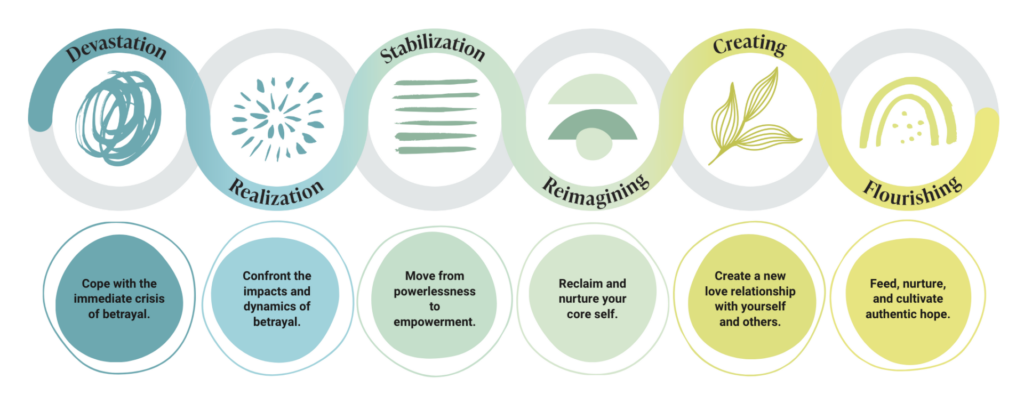
Last week we began talking about re-imagining, the fourth phase in the Braving Hope™ Process. This phase marks a shift from focusing primarily on coping with what has happened to thinking about your life in broader terms as you look toward the future.
This process starts with an examination of trauma. Many betrayed partners have experienced what I call multi-layered trauma. What this means is that before they experienced the trauma that results from being cheated on and systematically lied to, they had other experiences of betrayal trauma, most often during their childhood.
The concept of betrayal trauma addresses far more than just the trauma of adult betrayal through sexual and relational infidelity. More generally, it refers to the traumatic impact of someone you depend upon betraying you through neglect, abandonment, or physical, sexual, emotional, or spiritual abuse—especially during your developmental years. This includes a full range of experiences from what we might typically think of as overt abuse, like being slapped or hit or verbally abused, to more covert experiences, such as not getting your emotional, intellectual, or spiritual needs fully met, or being expected to behave like a little adult instead of a child.
If you experienced betrayal trauma in childhood, that trauma reverberates through you when you encounter fresh betrayal trauma as an adult. New trauma awakens the emotions of your childhood trauma and adds them to the reactions that are being triggered by your current sexual and relational trauma. Suddenly, you’re dealing with a double whammy of trauma.
For example, if you had a father who was busy being a provider and was often absent or distracted when he was present, you may have wounds from not getting your needs for attention, affirmation, direction, care, and nurturance met by this preoccupied parent. Then, in your adulthood, when you experience your partner as disconnected, withdrawn, preoccupied, or in some way abandoning or rejecting, you are likely to have not only feelings about that but feelings from the wounds with your unavailable father. This is the experience of multi-layered trauma with which many betrayed partners must cope.
During the re-imaging phase, attention turns to exploring and beginning to understand and heal not just the current trauma but past traumas. In this phase, most betrayed partners start to identify and connect with the longing they feel for something more. They realize they want and need something more than what they had even before they found out about the cheating and lying. This is actually a gift that is hidden in the betrayal, and partners come to recognize, over time, that even though they did not choose betrayal and they are still mad as hell that they are dealing with it, the betrayal has opened a doorway leading to the possibility of a much deeper healing and freedom than they had previously imagined.
The re-imagining phase can be a pivot point in reclaiming your sense of self. Your focus shifts from an emphasis on your cheating partner and what he is or isn’t doing to understanding more about who you are, what has shaped you, and what your internal and external life could be like as you heal and shed the restrictions created by past and present wounds.
This is a phase that includes intensive work on past and present trauma in order to reclaim yourself, and to move out of old patterns that perpetuate harmful behaviors in your life and inhibit you in your relationships—with yourself, with others, and with your Higher Power. Hopefully, this work is done with an understanding that the pathway leading you through your past traumas eventually leads to a changed and happier future.












